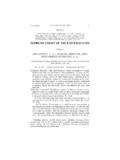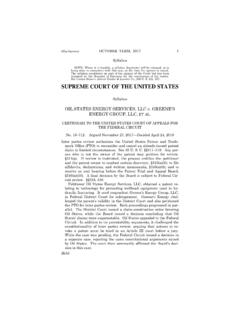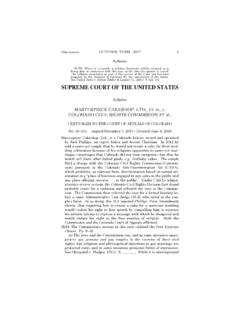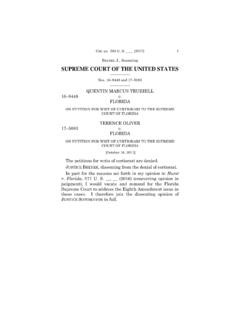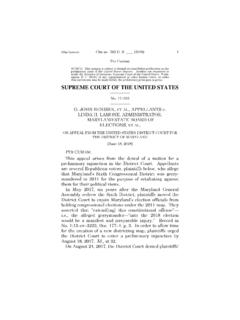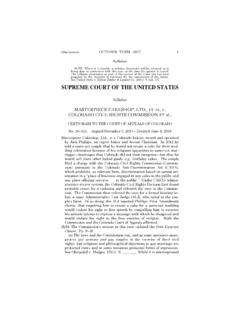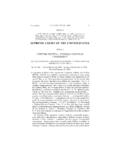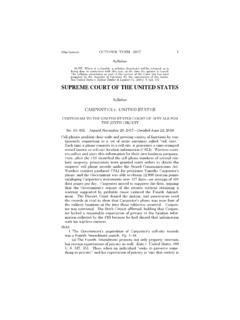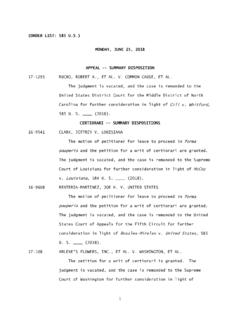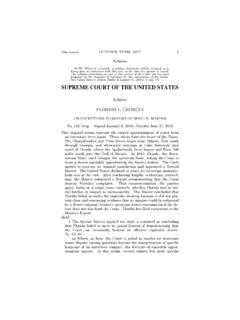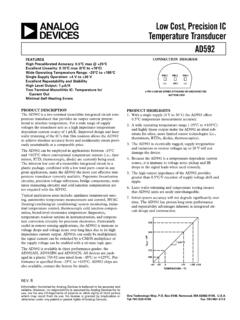Transcription of SUPREME COURT OF THE UNITED STATES
1 1 (Slip Opinion) OCTOBER TERM, 2020 Syllabus NOTE: Where it is feasible, a syllabus (headnote) will be released, as is being done in connection with this case, at the time the opinion is issued. The syllabus constitutes no part of the opinion of the COURT but has been prepared by the Reporter of Decisions for the convenience of the reader. See UNITED STATES v. Detroit Timber & Lumber Co., 200 U. S. 321, 337. SUPREME COURT OF THE UNITED STATES Syllabus SANCHEZ ET UX. v. MAYORKAS, SECRETARY OF HOMELAND SECURITY, ET AL. CERTIORARI TO THE UNITED STATES COURT OF APPEALS FOR THE THIRD CIRCUIT No. 20 315. Argued April 19, 2021 Decided June 7, 2021 Petitioner Jose Santos Sanchez is a citizen of El Salvador who challengesthe denial of his application to become a lawful permanent resident (LPR) of the UNITED STATES .
2 Sanchez entered the UNITED STATES unlaw-fully in 1997. In 2001, the Government granted him Temporary Pro-tected Status (TPS). The TPS program allows foreign nationals of a country designated by the Government as having unusually bad or dangerous conditions to live and work in the UNITED STATES while the conditions last. See 1254a. In 2014, Sanchez applied under 1255 of the immigration laws to obtain LPR status. Section 1255 provides a way for a nonimmigrant a foreign national lawfully present in this country on a temporary basis to obtain an [a]djustment of status toLPR. 8 U. S. C. 1255. The UNITED STATES Citizenship and Immigra-tion Services determined Sanchez ineligible for LPR status because he entered the UNITED STATES unlawfully.
3 Sanchez successfully chal-lenged that decision before the District COURT , which reasoned that Sanchez s TPS required treating him as if he had been lawfully admit-ted to the country for purposes of his LPR application. The Third Cir-cuit reversed, finding Sanchez s unlawful entry into the country pre-cluded his eligibility for LPR status under 1255, notwithstanding hisTPS. Held: A TPS recipient who entered the UNITED STATES unlawfully is not eligible under 1255 for LPR status merely by dint of his TPS. Section 1255 provides that eligibility for LPR status generally requires an ad-mission into the country defined to mean the lawful entry of the alien into the UNITED STATES after inspection and authorization by an immigration officer.
4 1101(a)(13)(A). Sanchez did not enter lawfully. 2 SANCHEZ v. MAYORKAS Syllabus And his TPS does not eliminate the effect of that unlawful entry. Sec-tion 1254a(f)(4) provides that a TPS recipient who applies for perma-nent residency will be treated as having nonimmigrant status thestatus traditionally and generally needed to invoke the LPR process under 1255. But that provision does not aid the TPS recipient in meeting 1255 s separate admission requirement. Lawful status and admission are distinct concepts in immigration law, and establishingthe former does not establish the latter. Sanchez resists this conclu-sion, arguing that the statute s directive that a TPS recipient shall beconsidered.
5 As a nonimmigrant for purposes of 1255 means he must also be considered as admitted. But the immigration laws no-where state that admission is a prerequisite of nonimmigrant there is no reason to interpret the TPS provision s conferral of nonimmigrant status as including a conferral of admission. In fact, contrary to Sanchez s position, there are immigration categories inwhich individuals have nonimmigrant status without admission. See, , 1101(a)(10), 1101(a)(15)(U), 1182(d)(14). Thus, when Congress confers nonimmigrant status for purposes of 1255, but says nothingabout admission, the COURT has no basis for ruling an unlawful entranteligible to become an LPR. Pp. 4 9. 967 F. 3d 242, affirmed. KAGAN, J.
6 , delivered the opinion for a unanimous COURT . _____ _____ 1 Cite as: 593 U. S. ____ (2021) Opinion of the COURT NOTICE: This opinion is subject to formal revision before publication in the preliminary print of the UNITED STATES Reports. Readers are requested to notify the Reporter of Decisions, SUPREME COURT of the UNITED STATES , Wash-ington, D. C. 20543, of any typographical or other formal errors, in order that corrections may be made before the preliminary print goes to press. SUPREME COURT OF THE UNITED STATES No. 20 315 JOSE SANTOS SANCHEZ, ET UX., PETITIONERS v. ALEJANDRO N. MAYORKAS, SECRETARY OF HOMELAND SECURITY, ET AL. ON WRIT OF CERTIORARI TO THE UNITED STATES COURT OF APPEALS FOR THE THIRD CIRCUIT [June 7, 2021] JUSTICE KAGAN delivered the opinion of the COURT .
7 Petitioner Jose Santos Sanchez entered this country un-lawfully from El Salvador. Years later, because of unsafe living conditions in that country, the Government granted him Temporary Protected Status (TPS), entitling him tostay and work in the UNITED STATES for as long as those con-ditions persist. Sanchez now wishes to become a lawful per-manent resident (LPR) of the UNITED STATES . The questionhere is whether the conferral of TPS enables him to obtain LPR status despite his unlawful entry. We hold that it does not. I Section 1255 of the immigration laws provides a way for a nonimmigrant a foreign national lawfully present inthis country on a designated, temporary basis to obtain an [a]djustment of status making him an LPR. 8 U.
8 S. C. 1255 (boldface deleted); see 1101(a)(15) (listing classes ofnonimmigrants, such as students and tourists). Under that section, a nonimmigrant s eligibility for such an adjustment to permanent status depends (with exceptions not relevant 2 SANCHEZ v. MAYORKAS Opinion of the COURT here) on an admission into this country. And an admis-sion is defined as the lawful entry of the alien into the UNITED STATES after inspection and authorization by an im-migration officer. 1101(a)(13)(A). The admission or, to use the definitional phrase, lawful entry requirementappears in two pertinent provisions of 1255.
9 One STATES that a nonimmigrant may become an LPR only if he hasbeen inspected and admitted or paroled into the UNITED STATES . 1255(a). And another STATES that a nonimmigrant who has previously worked without authorization in the UNITED STATES may become an LPR only if his presence here is pursuant to a lawful admission. 1255(k)(1); see 1255(c)(2).1 A separate provision of immigration law establishes the TPS program, which provides humanitarian relief to for-eign nationals in the UNITED STATES who come from specified countries. See 1254a. The Government may designate a country for the program when it is beset by especially bador dangerous conditions, such as arise from natural disas-ters or armed conflicts.
10 The country s citizens, if already present in the UNITED STATES , may then obtain TPS. That status protects them from removal and authorizes them towork here for as long as the TPS designation lasts. A per-son s unlawful entry into the UNITED STATES will usually not preclude granting him TPS. See 1254a(c)(2)(A)(ii); 8 CFR (2020). And relevant here, the TPS provision STATES : [F]or purposes of adjustment of status under section 1255, a person given TPS shall be considered as being in, and 1255(a) s, applies even if the nonimmigrant has been paroled into the maintaining, 1254a(f )(4). lawful status as a nonimmigrant. 1 Section 1255(k) s requirement of a lawful admission, unlike UNITED STATES that is, received temporary permission to enter the coun-try for urgent humanitarian reasons or significant public benefit.
